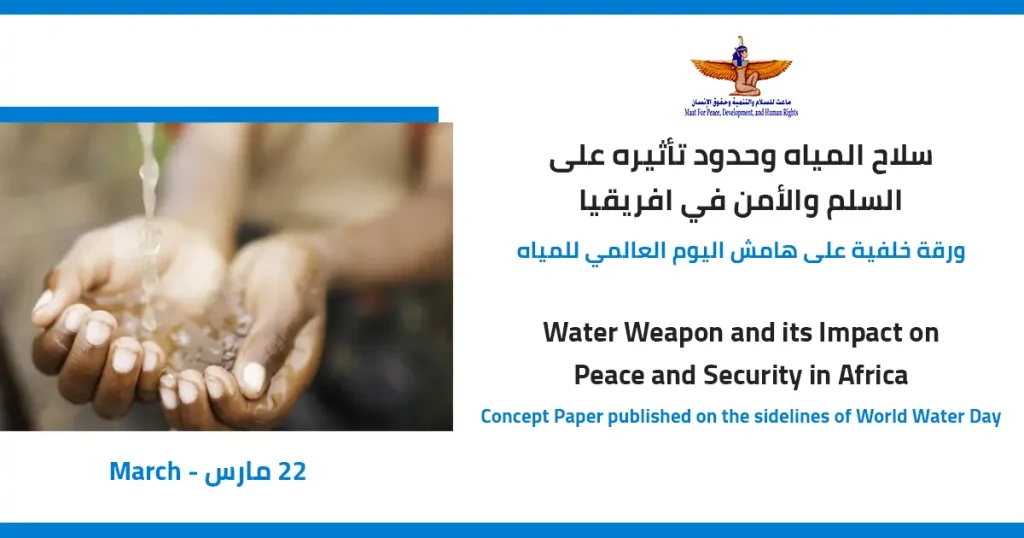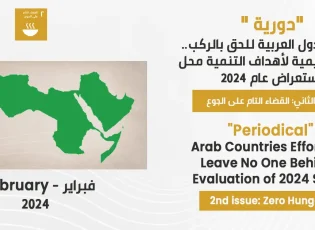Monsif: extreme weather events and climate change is a challenge impeding the path of sustainable development in East Africa
EssamEldin: We recommend Somalia to create a body of experts to study national development sectors and accelerate the work of the 2024 Agenda
Kidan: The Eritrean government continues to underestimate the right to development as one of the basic human rights principles
Al-Khanaqi: We call on the Ethiopian government to provide protection for the Benishangul-Gumuz region in accordance with Article 13 of the UN Charter
On the sidelines of its participation in the eighth session of the Africa Regional Forum on Sustainable Development (ARFSD), Maat for Peace, Development and Human Rights stated that sustainable development is markedly deteriorating in East Africa as a whole, and continues to face violent shocks for various reasons over the past two years. In the framework of the preparatory meetings for the upcoming session of the High-level Political Forum on Sustainable Development (HLPF), Maat for Peace organized a virtual event entitled “Achieving Sustainable Development in Africa: A Closer Look at East African Countries” focusing on Eritrea, Somalia and Ethiopia as East African countries subject to review in the upcoming session of the HLPF.
Hagar Monsif, Vice-Chairman of the Board of Trustees of Maat for African Affairs and Sustainable Development, pointed out the challenges facing East African countries in relation to the development path, by stressing the phenomena of extreme climate change that are now hitting all East African countries, such as drought, desertification and flood risk.
In this context, Helen Kidan, head of advocacy at the Eritrean movement for democracy and human rights (EMDHR), expressed its resentment of the Eritrean government practices, which affect the rights of all Eritrean people. At a time when the Covid-19 pandemic reached its peak, the Eritrean government used it as a means to close all Catholic health facilities across the country.
Kidan also referred to the Eritrean government's involvement in the war in Tigray, which led to repression against the Eritrean people instead of investing in education and the future of their youth, as young people are forced to perform national service indefinitely, and are forced to commit crimes against humanity and against the civilian population in Tigray.
The Eritrean government called for the necessity to abide by all international norms and laws in a way that contributes to the completion of development plans and the promotion of work on the development path of all the Eritrean people.
Looking at the case of Somalia, Basant Essam El Din emphasized; Deputy Director of the African Affairs and Sustainable Development Unit at Maat Foundation on the deteriorating development situation in Somalia, pointing to the Somali government's neglect of submitting its voluntary national reports within the sessions of the high-level political forum. Issam stated that vulnerable and marginalized groups, especially women and children, are facing many human rights challenges in Somali society. The Somali government recommended the necessity of forming a specialized body comprising a group of experts in the fields of development to study the basic sectors of development in Somalia, in order to accelerate the work of the National Development Agenda 2024 and identify the scope of weakness and work to solve it.
On the other hand, Ibrahim al-Khanaqi, head of the Benishangul Human Rights Foundation, said that the residents of the Benishangul-Gumuz region are leading a miserable life due to the conflict, especially after the construction of the Gran Ethiopian Renaissance Dam (GERD) on their lands and the subsequent policies of forced displacement, as well as the removal of 400 villages, in a clear disregard of the international and African community. Al-Khanaqi added that the Ethiopian government is committing systematic genocide within the region, stressing that hundreds of villages are used as military command centers. He further called on the Ethiopian government and the international community to provide protection for the Benishangul-Gumuz region in accordance with Article 13 of the United Nations Charter.
Notably, Maat is deeply interested in sustainable development given its capacity as North Africa Coordinator at the NGO Major Group for Africa of the United Nations Department of Economic and Social Affairs (UNDESA) and a Member of the General Assembly of the AU Economic, Social and Cultural Council (ECOSOCC). Moreover, Maat holds an observer status at the African Commission on Human and Peoples' Rights.











